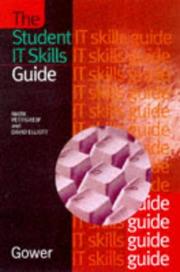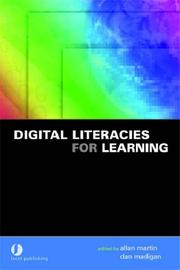| Listing 1 - 10 of 73 | << page >> |
Sort by
|
Book
ISBN: 012811956X 0128119551 9780128119563 9780128119556 Year: 2017 Publisher: Cambridge, Massachusett : Elsevier,
Abstract | Keywords | Export | Availability | Bookmark
 Loading...
Loading...Choose an application
- Reference Manager
- EndNote
- RefWorks (Direct export to RefWorks)
Computer literacy. --- Digital literacy --- Literacy, Computer --- Technological literacy
Book
ISBN: 395489873X 9783954898732 9783954898787 Year: 2016 Publisher: Hamburg, [Germany] : Anchor Academic Publishing,
Abstract | Keywords | Export | Availability | Bookmark
 Loading...
Loading...Choose an application
- Reference Manager
- EndNote
- RefWorks (Direct export to RefWorks)
Computer literacy. --- Digital literacy --- Literacy, Computer --- Technological literacy
Book
ISBN: 3030610896 3030610888 Year: 2021 Publisher: Cham, Switzerland : Springer,
Abstract | Keywords | Export | Availability | Bookmark
 Loading...
Loading...Choose an application
- Reference Manager
- EndNote
- RefWorks (Direct export to RefWorks)
Computer literacy. --- Digital literacy --- Literacy, Computer --- Technological literacy
Periodical
Abstract | Keywords | Export | Availability | Bookmark
 Loading...
Loading...Choose an application
- Reference Manager
- EndNote
- RefWorks (Direct export to RefWorks)
Computer literacy --- Computer-assisted instruction --- Educational technology --- Digital literacy --- Literacy, Computer --- Technological literacy
Book
ISBN: 022646959X 9780226469591 9780226469317 022646931X 9780226469454 022646945X Year: 2017 Publisher: Chicago London
Abstract | Keywords | Export | Availability | Bookmark
 Loading...
Loading...Choose an application
- Reference Manager
- EndNote
- RefWorks (Direct export to RefWorks)
A trio of headlines in the Chronicle of Higher Education seem to say it all: in 2013, "A Bold Move Toward MOOCs Sends Shock Waves;" in 2014, "Doubts About MOOCs Continue to Rise," and in 2015, "The MOOC Hype Fades." At the beginning of the 2010s, MOOCs, or Massive Open Online Courses, seemed poised to completely revolutionize higher education. But now, just a few years into the revolution, educators' enthusiasm seems to have cooled. As advocates and critics try to make sense of the rise and fall of these courses, both groups are united by one question: Where do we go from here? Elizabeth Losh has gathered experts from across disciplines-education, rhetoric, philosophy, literary studies, history, computer science, and journalism-to tease out lessons and chart a course into the future of open, online education. Instructors talk about what worked and what didn't. Students share their experiences as participants. And scholars consider the ethics of this education. The collection goes beyond MOOCs to cover variants such as hybrid or blended courses, SPOCs (Small Personalized Online Courses), and DOCCs (Distributed Open Collaborative Course). Together, these essays provide a unique, even-handed look at the MOOC movement and will serve as a thoughtful guide to those shaping the next steps for open education.
MOOCs (Web-based instruction) --- MOOC. --- digital learning. --- digital literacy. --- digital rhetoric. --- higher education. --- open access. --- pedagogy.

Abstract | Keywords | Export | Availability | Bookmark
 Loading...
Loading...Choose an application
- Reference Manager
- EndNote
- RefWorks (Direct export to RefWorks)
Study methods --- Didactic strategies --- Computer. Automation --- Pupil counseling. Pupil guidance --- Computer literacy. --- Computer literacy --- Digital literacy --- Literacy, Computer --- Technological literacy
Book
ISBN: 9783839473788 Year: 2024 Publisher: Bielefeld : transcript Verlag,
Abstract | Keywords | Export | Availability | Bookmark
 Loading...
Loading...Choose an application
- Reference Manager
- EndNote
- RefWorks (Direct export to RefWorks)
Despite the increasing influence of data technologies on our world, many people still lack a profound understanding of what this ›datafication‹ means for their lives and our societies. Ina Sander argues that this knowledge gap cannot be addressed by digital skills alone, but that more critical and empowering approaches are needed. Through a review of existing literacies, an analysis of established education concepts, and empirical research on online educational resources about datafication, she develops a framework for »critical datafication literacy«. Novel insights on the design strategies, pedagogical methods and challenges of practitioners who foster such education add to her analysis.
SOCIAL SCIENCE / Media Studies. --- Data Literacy. --- Datafication. --- Digital Literacy. --- Digital Media. --- Digitalization. --- Education. --- Educational Research. --- Internet. --- Media Studies. --- Media.
Book
ISBN: 3839457602 3837657604 Year: 2021 Publisher: Bielefeld transcript Verlag
Abstract | Keywords | Export | Availability | Bookmark
 Loading...
Loading...Choose an application
- Reference Manager
- EndNote
- RefWorks (Direct export to RefWorks)
Digital sovereignty has become a hotly debated concept. The current convergence of multiple crises adds fuel to this debate, as it contextualizes the concept in a foundational discussion of democratic principles, civil rights, and national identities: is (technological) self-determination an option for every individual to cope with the digital sphere effectively? Can disruptive events provide chances to rethink our ideas of society - including the design of the objects and processes which constitute our techno-social realities? The positions assembled in this volume analyze opportunities for participation and policy-making, and describe alternative technological practices before and after the pandemic.
Digital Sovereignty; Digital Literacy; Activism; Privacy; Crisis; Design; Diagnosis of Our Time; Internet; Democracy; Media Philosophy; Social Inequality --- Activism. --- Crisis. --- Democracy. --- Design. --- Diagnosis of Our Time. --- Digital Literacy. --- Internet. --- Media Philosophy. --- Privacy. --- Social Inequality. --- Sovereignty. --- Sovereignty --- State sovereignty (International relations) --- International law --- Political science --- Common heritage of mankind (International law) --- International relations --- Self-determination, National --- Law and legislation --- Digital Sovereignty --- Digital Literacy --- Activism --- Privacy --- Crisis --- Design --- Diagnosis of Our Time --- Internet --- Democracy --- Media Philosophy --- Social Inequality
Book
ISBN: 0201091224 Year: 1985 Publisher: Reading (Mass.): Addison-Wesley
Abstract | Keywords | Export | Availability | Bookmark
 Loading...
Loading...Choose an application
- Reference Manager
- EndNote
- RefWorks (Direct export to RefWorks)
Besoins (formation) Behoeften (opleiding) --- Tests Tests --- Ordinateurs Computers --- Formation professionnelle Beroepsopleiding --- Management Management --- Information (gestion) Informatie (management) --- Computer literacy --- Management --- Digital literacy --- Literacy, Computer --- Data processing --- Technological literacy

ISBN: 9781856045636 1856045633 1306342252 1856049876 9781856049870 Year: 2006 Publisher: London Facet
Abstract | Keywords | Export | Availability | Bookmark
 Loading...
Loading...Choose an application
- Reference Manager
- EndNote
- RefWorks (Direct export to RefWorks)
In the 21st century, digital tools enable information to be generated faster and in greater profusion than ever before, to the point where its extent and value are literally beyond imagining. Such quantities can only be meaningfully addressed using more digital tools, and thus our relationship to information is fundamentally changed. This situation presents a particular challenge to processes of learning and teaching, and demands a response from both information professionals and educators. Enabling education in a digital environment means not only changing the form in which learning opportunities are offered, but also enabling students to survive and prosper in digitally based learning environments. This collection brings together a global community of educators, educational researchers, librarians and IT strategists, to consider how learners need to be equipped in an educational environment that is increasingly suffused with digital technology. Traditional notions of literacy need to be challenged, and new literacies, including information literacy and IT literacy, need to be considered as foundation elements for digitally involved learners.
028.7 --- Information literacy --- 028.7 Information literacy --- Computer literacy --- Literacy, Information --- Information science --- Digital literacy --- Literacy, Computer --- Technological literacy --- Information literacy. --- Computer literacy.
| Listing 1 - 10 of 73 | << page >> |
Sort by
|

 Search
Search Feedback
Feedback About UniCat
About UniCat  Help
Help News
News